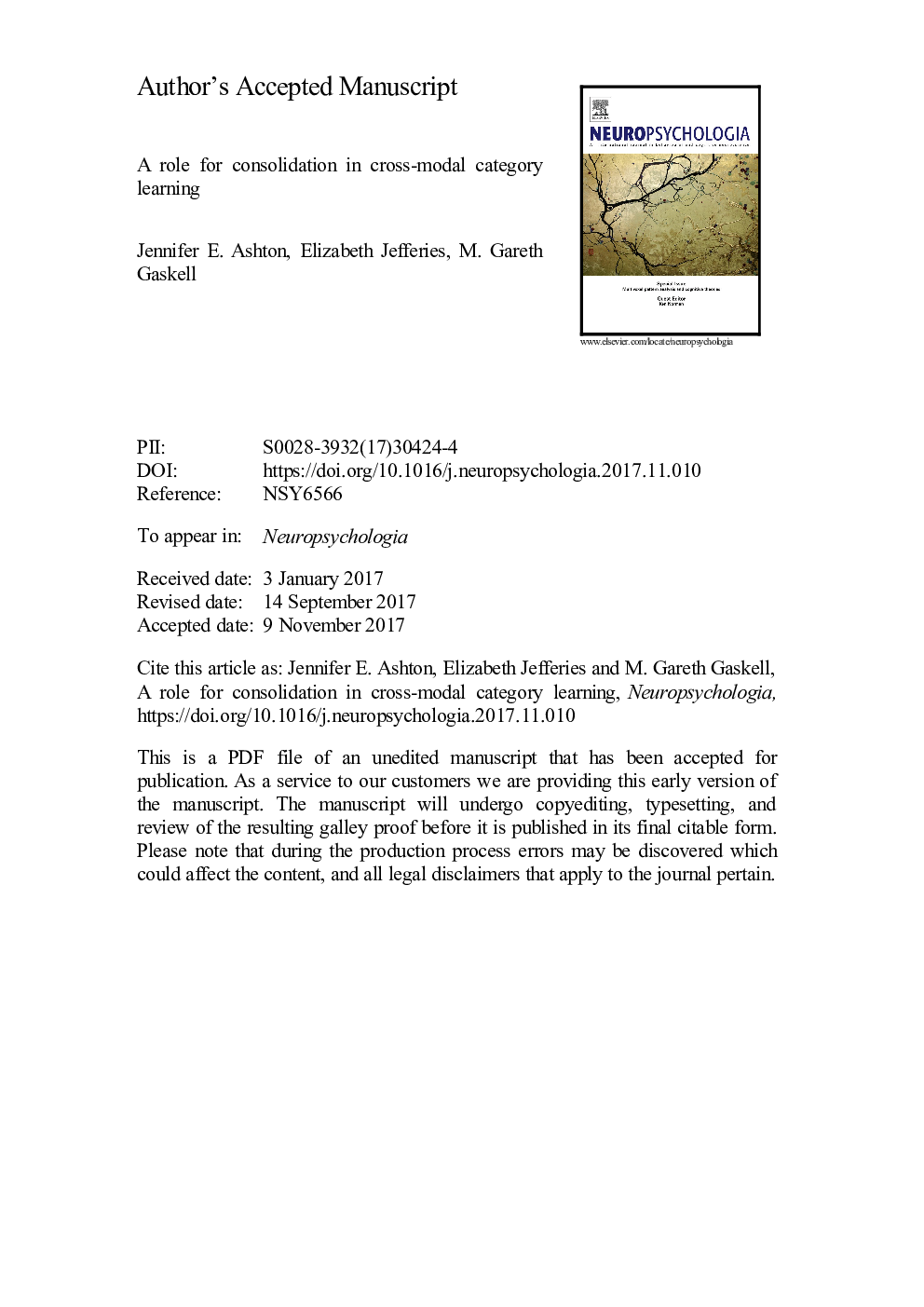| کد مقاله | کد نشریه | سال انتشار | مقاله انگلیسی | نسخه تمام متن |
|---|---|---|---|---|
| 7318152 | 1475547 | 2018 | 42 صفحه PDF | دانلود رایگان |
عنوان انگلیسی مقاله ISI
A role for consolidation in cross-modal category learning
ترجمه فارسی عنوان
نقش یکپارچه سازی در یادگیری رده متقابل
دانلود مقاله + سفارش ترجمه
دانلود مقاله ISI انگلیسی
رایگان برای ایرانیان
کلمات کلیدی
حافظه، خواب تثبیت، طبقه بندی،
ترجمه چکیده
توانایی دسته بندی اشیاء و حوادث یک مهارت بنیادی انسان است که به نمایندگی از دانش مفهومی چندبعدی بستگی دارد. این مطالعه به بررسی و تثبیت اطلاعات طبقه بندی شده که شرکت کنندگان را ملزم به ادغام اطلاعات در ابعاد بصری و شنیداری می کند. تاثیر تحریک وابسته به خواب و خواب با استفاده از یک پارادایم که در آن آموزش و آزمایش از طریق تأخیر در خواب شب یا خواب بیداری روزانه، با یک کار حافظه اپیزودیک مرتبط با همدیگر مورد استفاده قرار گرفت به عنوان اندازه کلاسی خواب وابستگی متقابل شرکت کنندگان شواهد خوبی از یادگیری گروهی نشان دادند اما تغییرات وابسته به خواب یا بیداری در حافظه برای اطلاعات مربوط به رده بلافاصله پس از تأخیر نشان ندادند. این در مقایسه با یادگیری زوج وابسته است، که در آن یادآوری حافظه از مزایای وابسته به خواب مشاهده شده است. برای تکرار یادگیری مفهومی در دنیای واقعی، که در آن دانش در سراسر چندین قسمت جداگانه بدست می آید، شرکت کنندگان فرصتی دیگر برای یادگیری گروهی با توجه به تاخیر تلفیقی فراهم می کردند. در اینجا ما در تعامل بین ادغام و یادگیری یافتیم؛ با بهبود بیشتر در دانش گروهی به عنوان نتیجه جلسه دوم یادگیری برای آن دسته از شرکت کنندگان که تاخیر خواب پر شده بود. این نتایج نشان می دهد نقش در خواب در تقویت دانش به تازگی بدست آمده؛ با این حال این مزیت به عنوان یک فایده فوری در یادآوری حافظه ظاهر نمیشود، بلکه با افزایش اثربخشی یادگیری آینده. این مطالعه به این ترتیب بینش هایی را در مورد فرایندهای مسئول ایجاد و توسعه بازنمایی های مفهومی ارائه می دهد.
موضوعات مرتبط
علوم زیستی و بیوفناوری
علم عصب شناسی
علوم اعصاب رفتاری
چکیده انگلیسی
The ability to categorize objects and events is a fundamental human skill that depends upon the representation of multimodal conceptual knowledge. This study investigated the acquisition and consolidation of categorical information that required participants to integrate information across visual and auditory dimensions. The impact of wake- and sleep-dependent consolidation was investigated using a paradigm in which training and testing were separated by a delay spanning either an evening of sleep or daytime wakefulness, with a paired-associate episodic memory task used as a measure of classic sleep-dependent consolidation. Participants displayed good evidence of category learning, but did not show any wake- or sleep-dependent changes in memory for category information immediately following the delay. This is in contrast to paired-associate learning, where a sleep-dependent benefit was observed in memory recall. To replicate real-world concept learning, in which knowledge is acquired across multiple distinct episodes, participants were given a second opportunity for category learning following the consolidation delay. Here we found an interaction between consolidation and learning; with greater improvements in category knowledge as a result of the second learning session for those participants who had a sleep-filled delay. These results suggest a role for sleep in the consolidation of recently acquired categorical knowledge; however this benefit does not emerge as an immediate benefit in memory recall, but by enhancing the effectiveness of future learning. This study therefore provides insights into the processes responsible for the formation and development of conceptual representations.
ناشر
Database: Elsevier - ScienceDirect (ساینس دایرکت)
Journal: Neuropsychologia - Volume 108, 8 January 2018, Pages 50-60
Journal: Neuropsychologia - Volume 108, 8 January 2018, Pages 50-60
نویسندگان
Jennifer E. Ashton, Elizabeth Jefferies, M. Gareth Gaskell,
